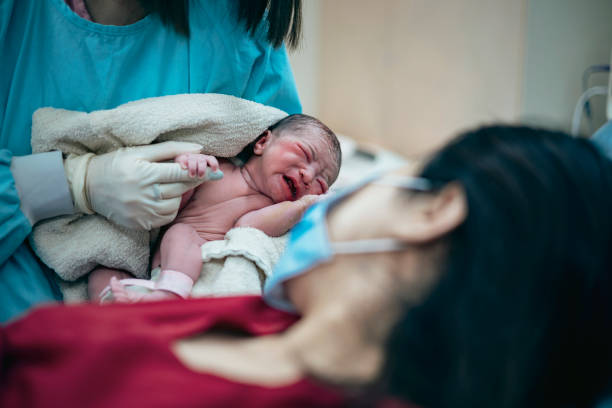What Causes Autism During Pregnancy? Understanding the Prenatal Factors

Autism Spectrum Disorder (ASD) is a neurodevelopmental condition that impacts communication, social interaction, and behavior. While its exact cause is not fully understood, research suggests that prenatal factors—both genetic and environmental—play a significant role in its development. Dr. Prakhar Jain, an esteemed psychiatrist, stresses the importance of understanding what causes autism during pregnancy to reduce risks. He believes that early awareness and intervention can help minimize the chances of developmental disorders like autism.
Dr. Prakhar Jain is a well-established psychiatrist in Mumbai, India, with expertise in diagnosing and treating autism spectrum disorder. Having vast experience with neurodevelopmental conditions, he has emerged as a prominent name for creating awareness about early detection of autism and prenatal effects. His empathetic, expert care offers significant insight into autism causes during pregnancy, enabling families to get improved outcomes for children on the autism spectrum.
In this blog, we will explore what causes autism during pregnancy, with insights from Dr. Prakhar Jain on the importance of early diagnosis and awareness.
Autism and the Prenatal Window of Development

The prenatal stage is most important in the development of the brain, where pregnancy factors determine whether a child will have autism. The first and second trimester are most important in the establishment of brain formation and neural connections. Any interruption during this time, either by genetic reasons, maternal health, or environmental exposure, can have an impact on brain wiring, resulting in autism. Studies point out that the prenatal window is critical in establishing the risk for neurodevelopmental disorders such as autism.
Infections, immune responses, hormonal changes, and exposure to toxins during pregnancy can impact fetal brain development. Additionally, genetic factors can interact with these prenatal influences, increasing the risk of autism. Understanding how the prenatal environment affects autism risk emphasizes the importance of early medical care and proactive management of maternal health, nutrition, and exposure to harmful substances to reduce autism risk and ensure healthy brain development.
Noticing subtle symptoms? Speak with a mental health professional—early support can make a big difference.
Let’s dive into the early stages of fetal brain growth and how these changes can lead to autism.
How Autism-Related Brain Changes Begin in the Womb

Brain changes associated with autism start in the womb, as early as the first trimester of gestation. Scientists suspect that the formation of the brain circuits that support social behavior, communication, and sensory processing is vulnerable to prenatal influences. Genetic mutations or disruptions in normal brain neuron growth may lead to autism.
During the early stages of pregnancy, the neural organization and functions of the brain are extremely susceptible to influences. The environment and genes can impact the course of brain development, which can result in irregular wiring of the brain linked to autism. Knowing these initial alterations enables experts, such as Dr. Prakhar Jain, to identify potential causes and prescribe protective or preventive measures during pregnancy.
Can genetics influence autism risk during pregnancy? Let’s discuss how inherited and new genetic factors play a role in prenatal brain development.
Genetic Factors Passed On or Arising in Pregnancy

- Inherited Genetic Mutations: Autism is inherited in some cases, with specific genes being associated with the condition. When there is an autism diagnosis in a family member, there can be a greater risk for other children.
- New Genetic Mutations: Autism may occur at times due to spontaneous new genetic mutations during pregnancy, not inherited but that appear during fetal development.
- Gene-Environment Interaction: There are some genetic components that can predispose a fetus to environmental factors such as toxins or infections, and raise the risk for autism.
- X Chromosome and Sex: Studies have found that autism is more common in males, with certain genetic differences on the X chromosome being a possible cause of this higher risk.
- Genetic Syndromes: Genetic syndromes such as Fragile X Syndrome and Rett Syndrome are linked to autism. These may be inherited and raise the risk of autism.
- De Novo Mutations: New genetic mutations developed during pregnancy may have a major contribution to the development of autism, even though they are not passed on from either parent.
- Multifactorial Inheritance: Autism is likely caused by the interaction of multiple genes rather than one single mutation. The combined effect of several genetic factors may increase autism risk.
- Genetic Testing: Genetic testing and counseling can help families assess genetic risks for autism and provide early insights into potential outcomes.
Could maternal health affect autism development in your baby? Let’s explore how conditions like diabetes and obesity can increase autism risk.
Maternal Health Conditions That Influence Autism Risk

Maternal health is a key factor in determining the onset of autism in the infant. Diabetes, obesity, high blood pressure, and thyroid conditions have been associated with higher chances of getting autism. These conditions in pregnant women can cause disruptions in the infant’s brain and nervous system development.
Dr. Prakhar Jain explains,
“Pre-existing maternal health conditions need to be managed so that the mother and the baby remain healthy. Good prenatal care can reduce the risks of such conditions.”
Pregnant women with chronic conditions have to consult their healthcare providers closely to watch for and manage their condition during pregnancy so that risks related to autism are minimized.
If panic-like symptoms keep recurring, it’s time to get evaluated for anxiety—don’t wait, consult a psychiatrist.
How do environmental toxins affect autism risk during pregnancy? Let’s discover how exposure to chemicals and pollutants influences fetal brain development.
Environmental and Chemical Influences on Autism Pathways
Environmental exposures during pregnancy, such as pollutants, chemicals, and medications, can alter the brain’s development and increase the risk of autism. For instance, exposure to heavy metals, pesticides, and endocrine-disrupting chemicals has been linked to developmental delays and neurodevelopmental disorders, including autism.
Dr. Prakhar Jain emphasizes,
“Prenatal exposure to certain environmental toxins can have a profound effect on brain development. It’s crucial to minimize exposure to harmful substances during pregnancy.”
Ensuring a clean, healthy environment and avoiding harmful chemicals during pregnancy can reduce the risk of autism.
Can infections during pregnancy impact autism risk? Let’s explore how immune system activation from infections may affect your baby’s brain development.
Maternal Infections and Immune Activation in Autism

Maternal infections, especially during the first and second trimesters of pregnancy, have been associated with an increased risk of autism in baby. When a mother’s immune system is activated in response to infections, it may affect fetal brain development. Inflammatory responses triggered by infections such as rubella, influenza, or cytomegalovirus can impede neural growth and increase the risk of autism.
Dr. Prakhar Jain advises,
“Prompt treatment of infections during pregnancy and preventive measures, such as vaccines, are essential to safeguard both the mother and child.”
Preventing infections and managing immune system responses are key to reducing the chances of developing autism.
How do birth-related factors influence autism risk? Let’s explore how issues like preterm birth or low birth weight can impact autism development.
Birth-Related Factors That Begin in Pregnancy

- Low Birth Weight: Babies born with low birth weight are at a higher risk of developmental delays, including autism, influenced by maternal health, nutrition, and pregnancy complications.
- Premature Birth: Premature birth (before 37 weeks) increases the likelihood of autism due to underdeveloped brain structures that can affect cognitive and social abilities.
- Oxygen Deprivation: Lack of oxygen (hypoxia) during pregnancy or delivery can cause brain injury, leading to developmental issues, including autism.
- Maternal Stress: High maternal stress levels during pregnancy can disrupt fetal brain development and increase the chances of complications, potentially leading to autism.
- Complicated Labor and Delivery: Complications like prolonged labor, forceps use, or emergency C-sections can impact neurological development, raising the risk of autism.
- Infections During Pregnancy: Maternal infections, particularly those causing premature labor, can affect the fetus and increase the risk of autism and other developmental disorders.
- Birth Defects: Certain birth defects, especially those affecting the brain, may increase autism risk, often linked to prenatal factors like maternal health or genetics.
- Multiple Gestation: Pregnancies with multiples (twins, triplets) are more likely to experience preterm birth and low birth weight, both of which are risk factors for autism.
- Placental Insufficiency: Insufficient blood flow to the placenta limits nutrient and oxygen delivery to the fetus, raising the risk of developmental disorders, including autism
Is it possible to reduce autism risk during pregnancy? Let’s dive into the steps you can take to minimize potential risks before your baby is born.
Can Autism Be Prevented During Pregnancy?

While it is not always possible to prevent autism, certain steps can be taken during pregnancy to reduce the risk. Maintaining good maternal health, avoiding harmful chemicals and infections, and seeking regular prenatal care are all crucial in ensuring the best possible outcome for both mother and baby.
Dr. Prakhar Jain advises,
“Although autism cannot always be prevented, early detection and interventions can significantly improve the quality of life for children with autism.”
Ensuring proper prenatal care is the most effective way to reduce risks and foster a healthy pregnancy.
Why is early awareness of autism so important? Let’s discuss how understanding prenatal risks can facilitate early detection and intervention, leading to better outcomes.
Dr. Prakhar Jain’s Insights on Early Autism Awareness

Conclusion
Understanding what causes autism during pregnancy is an essential part of promoting better prenatal care and preventing neurodevelopmental disorders. Various factors, including genetics, maternal health, infections, and environmental influences, can significantly impact a child’s development. Early intervention and awareness of these factors can help mitigate autism risk and improve outcomes for children on the autism spectrum. Consulting with experts like Dr. Prakhar Jain can provide valuable insights into managing prenatal care and early detection of autism.
Don’t wait until symptoms escalate—Consult a professional for strategies that help you live with greater calm and control.
FAQs
- What causes autism during pregnancy?
Autism can be influenced by genetic factors, maternal health, infections, and environmental exposures during pregnancy.
- Can autism be detected before birth?
While there are no definitive prenatal tests for autism, some factors, such as genetic testing and early screenings, may help assess the risk.
- How does maternal health affect autism risk?
Conditions like diabetes, obesity, and thyroid disorders during pregnancy can increase the risk of autism.
- Can early intervention help children with autism?
Yes, early intervention significantly improves outcomes for children with autism by enhancing their communication and social skills.
- What role does nutrition play in autism prevention?
Proper nutrition during pregnancy, including adequate folic acid, can support brain development and potentially reduce the risk of autism.
Disclaimer: The information shared in this content is for educational purposes and not for promotional use.

MBBS, M.D. (PSYCHIATRY), PDF, EMH (USA)
Child & Neuro Psychiatrist.
Dr. Prakhar Jain is a Psychiatrist in Mumbai, and has an experience of 7 years in this field. Dr. Prakhar Jain practices at Sir JJ Hospital, Wadia Hospital & Royal Clinic in Mumbai. He completed MBBS from Indira Gandhi Government Medical College, Nagpur and M.D. (Psychiatry) from Grant Medical College and Sir JJ Hospital, Mumbai.
